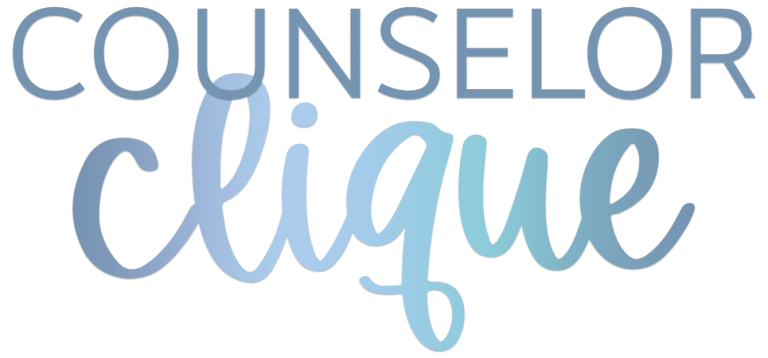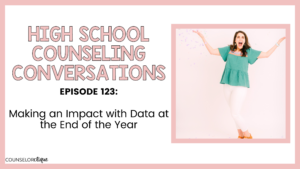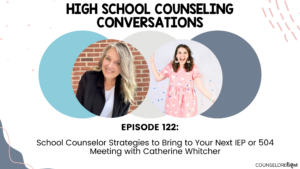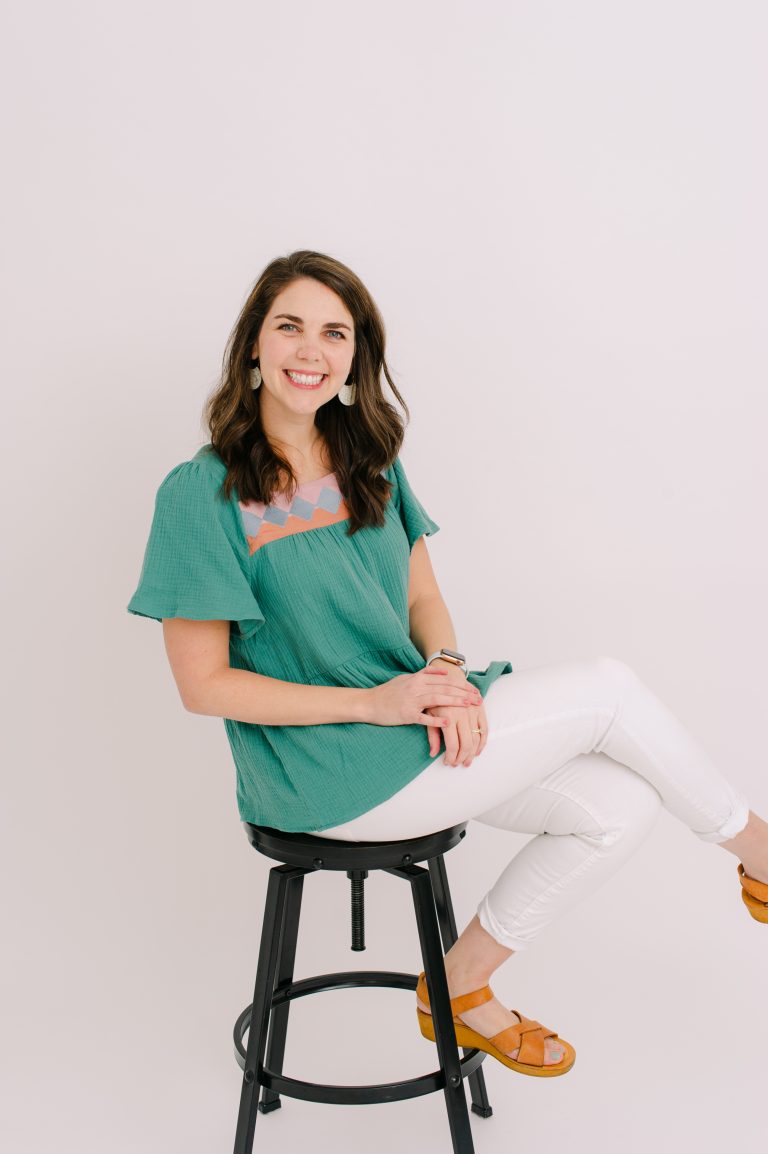
Here's What to Expect In This Episode:
What’s one big reason for counselors feeling stressed out, overworked, underpaid, and spread thin? A large caseload!
You know how it is when you’re juggling a large caseload. You feel like you can’t reach every student that you need to. There’s never enough hours in the day to tackle your endless to-do list. And don’t even get me started on all those emails!
I’m here to help you navigate the challenge of having a large caseload and find ways to manage your time, protect your well-being, and make a lasting impact on your students. If you have a counselor friend who is feeling the stress of a large caseload, be sure to share this episode with them!
Topics Covered in This Episode:
- What to do if you find yourself with a lot of non-counseling duties on your plate
- Reflecting on what overwhelms you the most about your large caseload
- Reimagining the caseload breakdown at your school
- Simple solutions that will alleviate email overwhelm
- Planning your year in a way that makes sense and doesn’t cause your large caseload ot make you crazy
- Getting clear on your goals as a school counselor
Resources Mentioned in This Episode:
- Join the Clique Collaborative high school counseling membership
- Book: The School Counselor’s Guide to Multi-Tiered Systems of Support
- Blog: Counselor Self-Care: The 5 Myths You’re Believing About Work Email Causing You to Fail at It
- Google Chrome Extension: Inbox When Ready
- Podcast: Episode 45, 4 Different Caseload Model Types (Plus My Honest Thoughts on Them)
- Podcast: Episode 77, What It Looks Like to Implement MTSS in a High School Setting with Dr. Jake Olsen and Dr. Peg Donohue
- Leave your review for School Counseling Conversations on Apple Podcasts
Other Blog Posts You Might Like:
- Podcast: Episode 60, Setting Boundaries with Others and Managing Expectations Around Burnout
- Podcast: Episode 56, Productivity Hacks to Beat Burnout with Alaina Schrader
- Blog: Focus on These 3 Relational Boundaries to Prevent Counselor Burnout
- Blog: Set These 3 Boundaries for a Better Work-Life Balance as a High School Counselor
Read the transcript for this episode:
0:00
If there’s something I know about high school counselors and school counselors really in general, I know that high school counselors get really fired up about caseload size, and more specifically large caseload size. I never hear anyone complaining or making note of their tiny caseload.
0:17
It’s often the reason counselors feel overworked, underpaid and spread thin. There are just not enough hours in the day to get to every student that we want to and that we need to. Do you have spreadsheets to organize your spreadsheets by now? Or do you have stacks of papers falling off your desk, or maybe that you’re shoving under your desk to look a little more professional when someone comes in for a meeting?
0:37
Me either, that’s never happened to me, there are definitely going to be times of the year that you just feel like you’re being dragged underneath the bus more than you feel like you’re driving the bus, your brain will be as frazzled as your desk represents that might be during back to school season. college application season, if you’re working with seniors, or springtime, as you’re doing registration meetings or all of the above.
1:00
There are going to be certain seasons of the school year where the chaos is multiplied by the number of students you have. And those of you with large caseload, those large caseload rightfully will make you crazy if you let them so hang on tight. So how do we manage our time protect our personal well being steward our energy when our caseload numbers seem off the charts?
1:21
Let’s identify the adjacent stressors that come with big case loads of students, and then decide how we can tackle those things with what we do have in our control. We are counselors after all right? Which means we’re critical thinkers, problem solvers, and level headed professionals who can do the stressful work with what were given.
1:47
You got into this profession to make a difference in your students lives, but you’re spread thin by all the things that keep getting added to your to do list. I can’t create more hours in the day, but I can invite you into my counselor clique where you’ll finally catch your breath. Come with me as we unpack creative ideas and effective strategies that will help you be the counselor who leaves a lifelong impact on your students. I’m Lauren tingle your high school counseling hype girl here to help you energize your school counseling program and remind you of how much you love your job.
2:19
If you find yourself with a lot of non counseling duties on your plate, let’s evaluate those. How do we get here? Did you step into a role that was heavy with these non counseling duties and you wanted the job so badly that you took them on? That really could have happened.
2:33
I’d be willing to guess if you have a lot of these, you’re probably not entirely happy in your role. Because you’re not seeing students, you’re not directly serving them and helping them in the ways that you expected you would when you came out of grad school. Rest assured though, not every role is made up of non counseling duties. In fact, many are not made up of non counseling duties at all.
2:54
If you get to a place where your non counseling duties are making your job satisfaction just non existent, honestly, it’s time to start looking elsewhere. I know the grass isn’t always greener somewhere else. But I bet it will be if you’re working with students, because I’m guessing that’s where you get your joy from in this job. So if all else fails, please remember that there are schools out there with supportive administrators who want to see counselors function in their proper roles.
3:18
There are principals out there who let counselors pursue direct hours with students without micromanaging them around every corner. Literally. I’ve never understood administrators who have time for this.
3:29
Now let’s talk about caseload breakdown. What is the breakdown right now of your students? And is there a way that you imagine that this could function better in your school? Is there any potential to hire another counselor next year or somewhere down the line? Is there a goal of making caseload smaller? Maybe this is not something that you have any control over, but maybe you’ve never asked the question before to the right people.
3:51
Have you asked this question before at your school or at your district level? Remember, if you don’t ask no one is going to assume making these changes on your behalf is something that you want. I know that seems really obvious, but they might not know that you’re drowning because of the size of your caseload. Go back and listen to episode 45 to hear my honest thoughts on four different caseload models.
4:12
Different things will work for different schools and settings. But I think an important point of view to consider here is not to get stuck in your ways. And to be honest, this is usually the administration who needs to hear this not the counselor, you’re a problem solver. I know that about you. You’re looking for a solution for the big case loads here. I know I’m preaching to the choir.
4:31
When looking at caseload, I also want you to remember that there will be flux each year. I’m talking it could be 30 to 50 kids that change on your caseload, if you are alpha or grade level, however you break it down. That’s just how it’s gonna be. One year on an alpha split, I had 74 seniors and the next year with the same alpha split, I did not change my letters. I had 50 Seniors. That feels like a huge difference when you’re in the throes of October.
4:56
If you’re doing a grade level split, the freshman counselor will have a lot more students than a senior counselor. But the senior counselors responsibilities might seem higher stakes, a lot of times. It’s important to remember that caseload models are a give and take, like there’s not a perfect one size fits all solution for everyone out there.
5:14
I do challenge you, and I want you to think and I want your team to think critically about caseload models in terms of strategy to alleviate burnout and manage your time and resources well. Consider other things that overwhelm you most about that large caseload. Is it the number of emails you get in a day?
5:30
I don’t think people outside of the high school counselor role, realize how much communication and information management we’re processing and how everything seems urgent, rightfully, some of it is, but some of it is someone else’s emergency and not yours. I always used to say, not my circus, not my monkeys, as I was laughing about getting my own boundaries in place and letting other people handle some of the emergencies.
5:55
If you need some more help with boundaries and self care in general, I’ll link to some past podcast episodes for you to reflect on this for yourself and what kind of season you’re in with your boundaries. But back to the emails. Is it true that when you leave your desk to go do a classroom lesson, and you come back there are hundreds of emails waiting for you? Probably.
6:14
Are you the counselor who answers email from home or from your phone just so you can feel like you’ve got them out of your inbox and you file them where they need to go, and it helps you feel productive? Or does it just feel like you never get a break when you’re doing that? I have strong opinions on this. So my apologies in advance if this rubs you the wrong way.
6:32
I wrote a blog post on the myth that you’re believing about your email. So I’ll link to that. There are ways to make your email more manageable while you’re at school. Here’s a tip that ties advocacy back to email, but it requires practice. I personally will not keep my mouth shut if someone leaves me a sassy voicemail that says I’ve been trying to call you for so many hours or so many days, I’ve been trying to get a hold of you.
6:56
When I call them back. I’ll say something genuinely like I’m so sorry. I’ve been in classrooms doing lessons on scholarships for two days straight. Thank you so much for your patience as I get back to all my emails and phone calls. I want to let them know what I was doing so that they know counselors do other things than sit and wait for their phone calls.
7:13
I know it might kind of sound sassy, but I’m just dishing them back what they are trying to give me on the other end of the phone. Okay, other than being sassy and speaking up for yourself, you can set certain times of your day to answer emails, whether that’s three times in the beginning, middle and end of the day. Or you can set a timer for how many emails you’re gonna get through. And when that timer goes off you are done.
7:37
Depending on how many you’re getting, this may feel doable just to check it off the list and get it done with or it may feel insurmountable. Try setting up some automations in your email, setting it so that emails from certain people go directly to certain folders and they never even make it to your inbox that they’re filtered, then you can check that filtered folder when you get time to do it.
7:56
So maybe you decide all the district emails go to a folder and you read those at the end of the day. Maybe you filter by anyone who has an email address that’s like at the school district’s email address like it’s going to come from students. And that’s easy to filter. All of those go to a folder. You filter any emails with the keyword scholarship and those go to another folder.
8:17
Take an inventory of the types of emails that you’re getting, and then set up some systems in your email and in your folders to make that run a little bit more smoothly. A helpful Google Chrome plugin that you can look into is called inbox when ready. Their mission in itself says protect your focus, spend less time on your email. Pretty sure that’s what you’re looking to do, right?
8:39
This productivity tool helps you from getting lost and distracted in your email and it helps you batch your emails to get them done and move on. I think if you install this and give it a shot, you’ll feel less stressed around email in general and just less reactive to your huge list of email tasks in front of you.
8:56
And you won’t open up your email to send one thing to someone and then get distracted and at a time suck and a time warp as you answer other emails. I know not everyone is going to feel the weight of hundreds of emails but depending on the size of your caseload, it’s highly probable that the number of emails you get with a large caseload, those are driving you crazy.
9:16
The Clique Collaborative is a membership for high school counselors designed to equip, encourage and connect counselors to their greater community. With a professional development driven mindset the membership hub comes loaded with 25 Plus instantly accessible PD videos completion certificates and bonus features like templates, checklists and counseling resources.
9:36
But the best part isn’t the features. It’s the changes you’ll see in your confidence and your counseling program. Inside you’ll find worthwhile practical and applicable PD that propels you to action and a community full of your people where you can grow, connect and feel validated. Does this sound like the support you’ve been looking for? If so, I want to invite you to check out the clique collaborative at cliquecollab.com.
10:02
My last thought for you if your large caseload is making you crazy, is to plan your year so that you can see all of your students in ways that makes sense for you and for your school, and then give that time to see the fruits of your labor. This may mean sticking with a new schedule or a quarterly plan all year before he really feel like your efforts have paid off.
10:22
If you don’t have a team to sit down and play in your year with or a team that’s excited about doing this, I’d still challenge you to think about it. If your caseload is huge, how will you see all your students and make a difference that doesn’t feel like you’re putting out fires all the time? You’re going to have to do it with intentionality. revamp your school counseling program to serve your students in tears, so that you can do this more effectively and efficiently. And if you have no idea what I’m talking about, I want you to go back and listen to episode 77 to hear from some experts in multi tiered systems of support, it makes a lot of sense in high school counseling.
10:57
If you’re considering diving into a more structured MTSS model for your program, and you just haven’t explored this before, go check out the book, The School Counselors Guide to Multi Tiered Systems of Support. This is more in depth than what you’ll hear on the podcast. But the authors are some of the guests from the podcast episode. So I’ll give you an Amazon link to that book in the show notes. I think it could really help you out.
11:18
Once you start learning about MTSS, you’re gonna say wow, this makes a lot of sense, especially for counselors with huge case loads. I also have a really nice template for an annual plan for high school counselors available as a bonus when you join the clique collaborative as a yearly member. It’s not sold anywhere else. So it’s definitely worth it for you to join us inside the membership for a variety of reasons.
11:40
But more specifically, this curriculum map gives you some structure for your year by grade level, what classroom lessons you want to teach what small groups who want to run, I have a blank template for you to completely fill in. And then I have a filled in template with suggestions for me on how to plan your year.
11:56
If that’s something you’re interested in getting your hands on head to cliquecollab.com and join us inside my PD driven High School Counseling membership the click collaborative, or you can at least check it out, click collab.com. You can always flesh out your own annual plan or annual calendar too. Start with things that you’ve done that have worked in your year. And then dream for the things that you’d like to add to fit in with your annual goals.
12:19
Maybe some of the goals in the back of your mind are to make contact with each of your students X amount of times in the year. Can you do that if you hit up every classroom twice in a semester, or maybe you’re planning on holding individual meetings with every student in the spring, and then do one classroom lesson each semester. After your needs assessment, fill in the topics that you want to teach your students in classroom lessons or fill in small group topics that you think would be beneficial for your students based on what they’re telling you that they need.
12:46
Get some ideas from my TPT store or use what you already have, but organize it in a curriculum map and even link it to your Google Drive like link to lessons that are already in there so that once you plan it, you don’t have to use any more brain space to find it or prep it. Your annual plan will be personal to your school counseling department, your goals, your caseload and your level of overwhelm with your caseload size.
13:10
I’m certain there are other adjacent barriers that come with large caseload sizes that are personal to you. But I challenge you to think critically about those issues and be a problem solver with them. If you need support along the way, don’t be afraid to approach your admin about the grim realities of a large caseload and ask them for what you need to be successful. I think it actually shows a lot of humility and maturity to ask for help or propose a change that could be feasible with some more or different supports in place.
13:37
You’ll be surprised at how much they don’t realize you need in the way of support money time or any of those other things that may help you if they just knew. As always, I’m just a DM or an email away. If I can help you think through any of the other roadblocks, that large caseload spresent that make you feel crazy.
13:55
I have a favor to ask of you before we go. If you have a co counselor who’s in the trenches with you with this large caseload, would you do me a favor and hit share on this episode and text it to them right now while you’re thinking about it. There’s nothing that spreads the word better about high school counseling conversations than you sharing an episode with a friend. Until next week, I’m cheering for you high school counselor. I’ll see you then.
14:19
Thanks for listening to today’s episode of high school counseling conversations. All the links I talked about today can be found in the show notes and also at counselorclique.com/podcast. Be sure to hit follow wherever you listen to your podcast so that you never miss a new episode. Connect with me over on Instagram. Feel free to send me a DM @counselorclique. That’s C-L-I-Q-U-E. I’ll see you next week.
Connect with Lauren:
Cheers + Happy Listening!
Like what you’re hearing? Follow and leave a review on Apple Podcasts. It helps other high school counseling friends find it!
Can’t contain your excitement? Share the pod! Tell a friend! Your word-of-mouth referrals mean the world to me!






